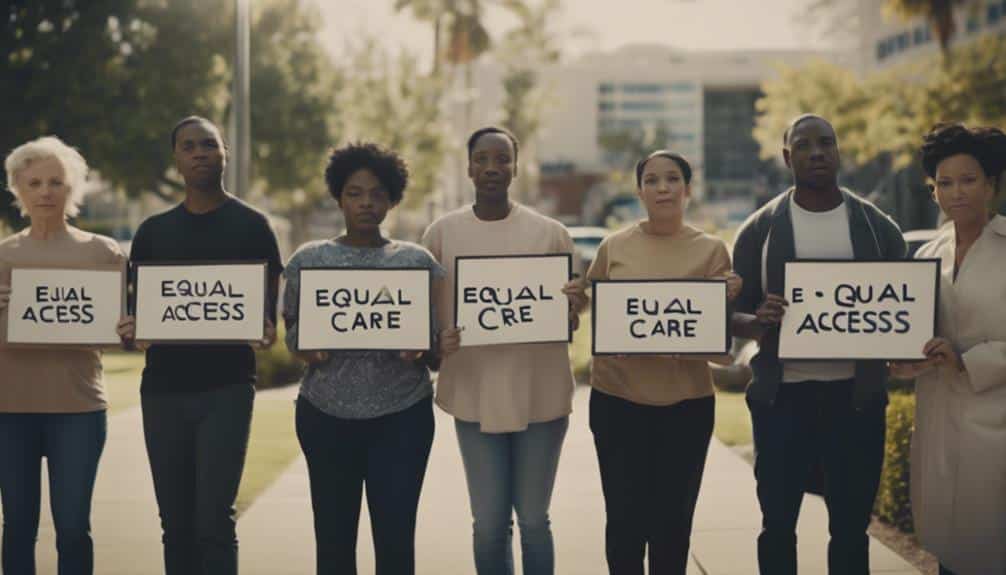In the landscape of cancer treatment equity, a multifaceted approach is essential for addressing disparities and ensuring equal access to quality care.
From community engagement initiatives to policy advocacy and research collaborations, five key avenues exist to support the advancement of treatment equity.
By exploring these strategies, we can uncover actionable steps that hold the potential to transform the way we approach cancer care and improve outcomes for all individuals affected by this disease.
1. Promoting Cancer Prevention and Screening

Promoting cancer prevention and screening is a fundamental pillar in the pursuit of equitable access to timely and effective cancer care. Regular cancer screenings are crucial in detecting cancer early when treatment is most successful.
Outreach efforts and education campaigns are essential in raising awareness about the importance of cancer prevention and screening. Access to screening programs, such as the National Breast and Cervical Cancer Early Detection Program, can significantly increase screening rates, particularly among underserved populations. Addressing barriers like financial constraints, lack of insurance, and transportation issues is vital to improving screening access.
Moreover, ensuring timely follow-up care post-screening is imperative for effective cancer prevention and control. Through these initiatives, we can strive to reduce disparities in cancer outcomes and promote health equity for all.
2. Addressing Systemic Racism in Healthcare
Addressing systemic racism in healthcare is crucial for reducing disparities in cancer treatment outcomes and ensuring equitable access to quality care for all individuals, particularly those from marginalized communities. Systemic racism contributes to healthcare disparities, with communities of color experiencing lower survival rates and access to quality care. Implementing anti-racist policies and practices is essential for achieving cancer treatment equity. This involves promoting diversity in the healthcare workforce, providing culturally competent care, and ensuring equitable access to resources for all patients. Studies have shown that Black patients are disproportionately affected by delayed diagnoses and inadequate treatment, highlighting the urgent need to address systemic racism in healthcare settings. By prioritizing anti-racist policies, healthcare systems can work towards equitable access to cancer treatment and improved outcomes for all patients.
| Systemic Racism in Healthcare | Impact on Cancer Treatment Equity | Strategies for Improvement |
|---|---|---|
| Contributes to disparities in treatment outcomes | Communities of color experience lower survival rates | Implement anti-racist policies |
| Leads to delayed diagnoses and inadequate treatment | Black patients receive less timely care | Promote diversity in the healthcare workforce |
| Requires promoting diversity and culturally competent care | Inadequate treatment affects marginalized populations | Ensure equitable access to resources |
3. Advocating for Equitable Access to Care

How can we ensure that all individuals have fair and timely access to quality cancer care?
Advocating for equitable access to cancer treatment is key to reducing disparities based on race, income, and geography. By supporting policy changes that prioritize equal access to screening, diagnosis, and treatment, we can improve cancer outcomes for all populations.
Addressing systemic barriers such as lack of insurance, transportation, and health literacy is crucial in promoting equity in cancer care. Empowering marginalized communities to advocate for their healthcare needs can lead to more equitable access to cancer treatment services.
Collaborating with healthcare providers, policymakers, and advocacy groups is essential in driving efforts to ensure that every individual receives the fair and timely access they deserve to quality cancer care.
4. Collaborating With Research Organizations
A wealth of expertise, resources, and data can be leveraged through strategic collaboration with research organizations to enhance our understanding of health disparities in cancer treatment.
By partnering with research entities, it is possible to identify innovative solutions and best practices to address systemic issues affecting equitable access to cancer care.
Insights from diverse perspectives can inform policies and interventions to improve health equity in cancer treatment.
Additionally, working with research organizations enables the development of evidence-based strategies to reduce disparities and promote equitable outcomes in cancer care.
This collaborative approach fosters a comprehensive understanding of health inequities, leading to more effective and sustainable solutions in cancer treatment.
5. Disseminating Best Practices for Equity

Collaborating with research organizations to enhance our understanding of health disparities in cancer treatment sets the foundation for disseminating best practices for equity.
To effectively disseminate best practices for equity, the following strategies are crucial:
- Promoting Culturally Competent Care Delivery: Guiding culturally sensitive care can significantly enhance equity in cancer treatment outcomes.
- Sharing Successful Models and Interventions: Disseminating information about successful approaches can help replicate effective strategies to promote health equity in cancer care.
- Utilizing Data-Driven Approaches: Educating healthcare providers and policymakers on data-driven strategies is essential for addressing inequities and achieving equitable access to cancer treatment.
Dive into the compelling stories and expertly crafted articles by A. Rochaun Meadows-Fernandez on Health Central, covering important health topics and narratives.
Conclusion
In conclusion, promoting cancer prevention and screening, addressing systemic racism in healthcare, advocating for equitable access to care, collaborating with research organizations, and disseminating best practices are crucial steps toward achieving cancer treatment equity.
By actively engaging in these strategies, we can work towards eliminating disparities in cancer care and ensuring all individuals have equal opportunities for prevention, early detection, and treatment.
Together, we can make a significant impact in advancing health equity for all cancer-affected individuals.




